Bali: Chickens, Roosters, and Rujak in Paradise
Article and photos by Shelley Graner
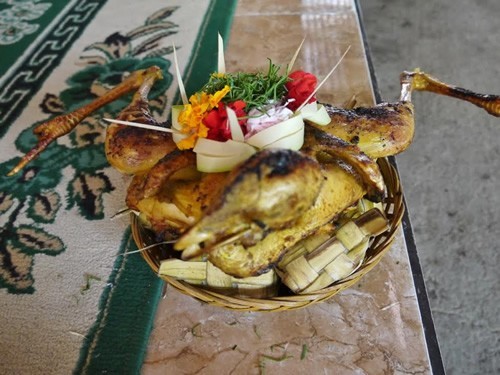
|
|
Chicken offering to the gods in Bali during the author's stay.
|
"See the white one over there?" Yuli pointed to a chicken pecking feed off the ground. "Yes," I replied, unsure where she was going with the conversation. "That's the one we're eating for lunch tomorrow." Gulp.
A week previously, I had arrived in Ubud, the cultural heart of Bali. I knocked on the door of my homestay at 11:30 p.m., feeling very embarrassed to wake my hosts. The bleary-eyed man escorted me through the dark to my bungalow at the back of the property. He was cordial but quiet, focused on getting me situated so he could go back to sleep. Balinese-style homes are built as a series of individual structures with lots of open space, making them ideal guesthouses. Buildings can be added individually to accommodate a growing family… or more guests. It's often the family's primary home, so when late arrivals come, there is no front desk clerk to take care of check-in.
After being handed the key and apologizing again, I climbed into my pajamas, plopped on the bed, and fell asleep. Some hours later, I was awakened by a cacophony of rooster crows. It was still dark (I thought roosters waited until dawn?).
I buried my head under the pillow, but it was futile. After tossing and turning for another hour, I begrudgingly surrendered to the day and peeked out the window. The light was breaking through just enough to reveal a Thermos on my porch table alongside a cup and jars of tea and sugar. My eyes widened, and then I flung open the door, drowned a tea bag in hot water, and sipped while swirls of steam escaped my cup. As the sun rose, it revealed trees in shades of green that I had never seen before. Birds started chirping. The roosters' work was done. I sank deeper into my little patio sofa and didn't peel myself off for another hour. Maybe more. I had forgotten the concept of time.
On the first full day, I walked down Monkey Forest Road, Ubud's main artery, where boutiques selling sarongs and coconut wood bowls sat next to restaurants serving pasta. I strolled past travel agencies and into art galleries. Hanging hobo bags caught my attention until a sign promoting 2 for 1 mojitos stole it away. Over my second cocktail, I spotted a couple wearing matching red and yellow striped Paul Frank monkey outfits. On Monkey Forest Road. Bizarre.
I soon learned that venturing just outside the touristy center was handsomely rewarded. Community temples, forests, and rice paddies extended in all directions. I am inexplicably drawn to rice fields, the way the color varies from an almost neon yellow-green to the deepest jungle green and every imaginable shade in between.
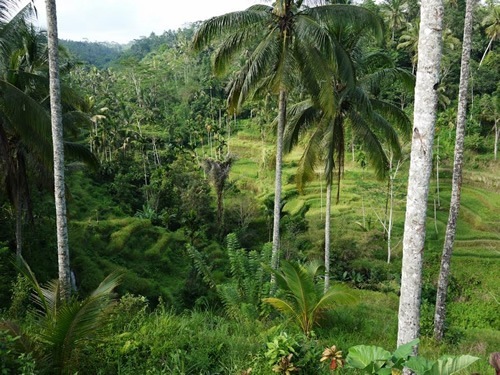
|
|
Forest and rice paddies in Bali.
|
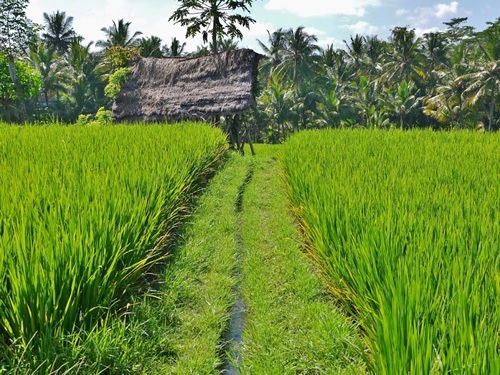
|
|
Rice paddies in Bali.
|
Some paddies are within walking distance of town, and I loved my peaceful strolls. Regardless, a motorbike is the best way to experience all that greenery. The warm, rushing wind and unobstructed views made touring the backroads an absolute favorite pastime. It was just me, the bike, some trees, and the rice. If I were to attempt to bottle freedom (an oxymoron, I know), that's where I would do so. I turned left, then right, then wherever I wanted. A map on my phone would return me to town, but I was only concerned with it when threatened by darkness. There's something different about the air in Bali: the stillness, the acceptance, the safety, the vitality, like a hug from my mom welcoming me home. I breathed deeply.
Riding down a narrow road with nothing but palms in either direction, I noticed an older woman bent over. I slowed to discover she was trying to lift a load of coconut husks and branches. The woman was under five feet tall and at least 70 years old, so I pulled over to help hoist the pile onto her head. It was heavy. She smiled, revealing a few sparse teeth, then turned and walked alone to some unknown destination.
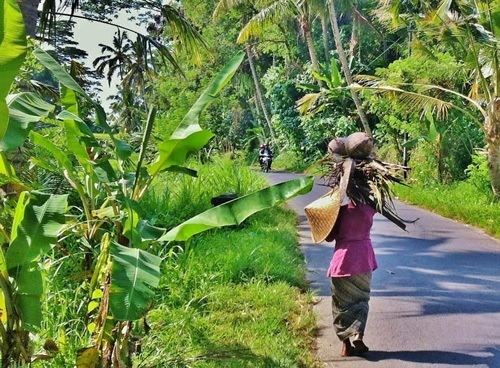
|
|
An elderly woman carrying heavy coconut husks.
|
One day during Galungan, a Balinese holiday spanning several days, I positioned myself on the side of a street to watch locals dressed in traditional clothes. They were making their way to the neighborhood temple for rituals and offerings. Some couples sped by on motorbikes, the women sitting side-saddle in their long, straight sarongs. Others walked with food and flowers for the Gods on their heads. I just sat and observed the parade of people, feeling like an insider and an outsider simultaneously. I am not exactly a participant, but I do not watch it as some voyeuristic cultural show for which I paid an entry fee. It was just a sincere and respectful appreciation of the local people, and I went unnoticed by all but a few who smiled warmly.
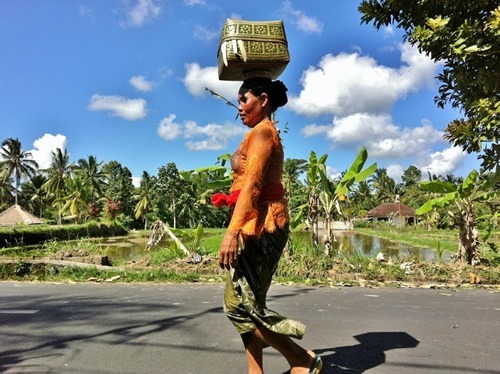
|
|
Balinese woman walking to the community temple.
|
Back in town I checked out Yoga Barn. In this beautiful Ubud institution, travelers and expats can "downward dog," or attempt to lie motionless during Tibetan Bowl Meditation. I tried the latter, but I still twitch when I hear the faint hum of a bowl. Constant ringing in my ears isn't peaceful or meditative — I must have missed something. Monday Movie Night, however, was something I could get behind. Movies are held in their circular, open-air studio in the true Balinese notion of the inside and the outside being as one. It's like a giant wooden gazebo on stilts. Attendees grabbed mats, blankets, bolsters, and bowls of fluffy white popcorn before sprawling across the floor to watch a movie projected onscreen. While the quality wasn't top-notch, it was more about the community. And the opportunity to one-up your neighbor's pillow fort. Not exactly the peace of exploring rice fields, but still a welcoming and accepting vibe — a unique intersection of Balinese magic and foreigner camaraderie.
Ibu Oka is another Balinese ritual where traditional babi guling (roast pig) is served. Their pork is tender, salty, moist, and delicious. It’s worth the visit, but it’s no secret, so those who don’t arrive early will wait in line. Finding the hidden gems requires effort, trial and error... and patience.
Street food is ubiquitous in Southeast Asia but not in Bali. Through my travels, I'd grown accustomed to losing myself in a bowl of noodle soup while squatting on a plastic stool or gnawing on a pork skewer mid-step. I took it for granted. One of the best ways to get acquainted with a country is through its roadside cuisine, so there was a hole in my heart until I finally met Bakso. On one of my last nights in Bali, I spotted a man pushing a metal cart through the darkness while heading out to dinner. BAKSO was painted in red letters. I had no idea what it was, but it was food, and on the street, so I was irresistibly drawn. I walked up to the cart and curiously peered towards the steam.
“Do you want some?” the man offered.
“What is it?” I asked.
“It’s soup with chicken meatballs. Here, try one.” He handed me a spoon with a meatball on it.
I blew on it and took a bite. “Wow, that’s delicious! I’ll take a bowl.”
I excitedly handed him some rupiah (less than US$1), then sat on the curb and enjoyed my Balinese chicken noodle soup. The chicken meatballs reminded me of the gelatinous beef version of Vietnamese pho bo vien. Well-fed, I returned my bowl and metal spoon to Mr. Bakso, thanking him for such a delicious meal. He chuckled at my enthusiasm. Many tourists may not fawn over such pedestrian food or even opt to try it, which is a shame. The soup was heavenly, but it was not my first unexpected chicken meal on the island.
In the coastal town of Candidasa, I met my feathered friend the night before I ate her. Her owner worked at the gift shop of the Bali Palms Resort. I don't typically stay in resorts, but a friend was joining me for one of my four weeks, so we splashed out. She mistakenly booked the room for the day before she arrived, so I was there alone for about 36 hours. Not that I was complaining about a pool view from our balcony and the ocean directly behind it.
I was starving upon arrival and didn’t have the lay of the land, so I went on a desperate food hunt in the gift shop. I asked the woman at the register about my closest lunch options.
“They sell nasi campur next door, but they’ll charge you double. Here, I’ll order it for you so you pay the local price.”
“Wow, that’s very nice of you. Thanks!” I responded. “Can you leave the shop?”
“Yeah, I’ll just lock the door. We’ll only be gone five minutes. No one comes in anyway.”
I devoured my Indonesian fried rice and followed Yuli back to the shop. She was clearly bored, and I had something on my schedule when my friend arrived the next night, so we talked. After getting better acquainted, she invited me to her house for coffee. I happily accepted, left the shop, and returned at 5 p.m. as instructed.
Yuli hopped on her motorbike with me on the back, and off we went, down the main road and onto a dirt path. The coconut grove we rode through was so dense, and the tire track so narrow that bushes and palm fronds brushed my legs. I squeezed them tighter against the bike. While only a mile away, it was much further every other way.
I heard Yuli’s house before I saw it. Her husband sold roosters for cock fights, so I was greeted with aggressive crowing.
Her home consisted of two main buildings facing one another. Each had a tiled ledge extending out from the door, which served as a makeshift patio where Yuli and I sat, our legs dangling off the edge. They also had an open-air temple with stone shrines, a staple of Balinese architecture. Yuli and her husband lived on one side with their two kids, while her in-laws stayed on the other.
Large and small chickens walked, clucked, and pecked feed off the dirt around us. Roosters, never silent, shifted in bamboo cages just feet away. There was the smell of animals in the air. They lived a very earthy and respectable way of life and were not shielded by wealth.
Yuli brought me a cup of coffee, so I stirred the grounds and sugar together in a whirl, then waited until they settled on the bottom of the glass before drinking. I told her about my recent travels. I heard from her about her two kids and the gift shop job she'd started only a month ago. Yuli was proud of her home and culture, mentioning more than once how happy she was to show me, an American tourist, the "real" Bali. I was humbled and grateful.
While we talked, her daughter watched "Tom & Jerry" on a square, rabbit-eared TV, the same show I used to watch as a kid. Looking at it through different eyes, I realized how universal it was. There was no talking, no language, nothing to dub. These simple hijinks stood up decades later to a completely different audience in a very distinct part of the world.
Before returning to the resort, Yuli asked me to return for a special lunch the following afternoon. That's when she pointed out which lucky chicken would be the main attraction. I tried to hide any horrified expression from my face as I graciously accepted.
When we pulled up to Yuli's village home the next day, a few women passed us carrying a heavy load of coconuts on their heads — eight to 10 each. The strength of these women is astounding. As we walked towards the back of the property, I saw our chicken friend flattened and skewered on a large bamboo stick. The freshly plucked skin was slathered with garlic and chili, soon to be roasted over a pile of coconut husks. Next to the fire was a holding pen for big, muddy pigs, another source of income for the family and dinner for someone else.
While lunch was cooking, rituals began at the family temple. Side-by-side, Yuli and her 7-year-old daughter knelt down and put their hands together in prayer. When the chicken was cooked, it was put in a basket with a flower offering on top and placed on one of the shrines. Incense burned beside it, and there were more prayers. I was invited inside but kept my distance respectfully so that I could watch without disturbing. Once the sacred rituals had concluded, it was time to feast.
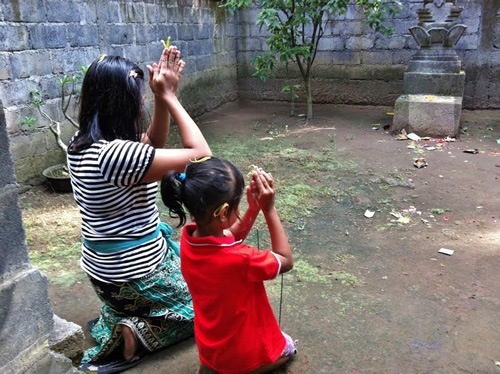
|
|
Yuli and her daughter praying.
|
The chicken was proudly presented alongside rice, vegetables, and a spicy coconut salad. We each doused our hands in a water bowl for cleaning, then used them to eat. I felt like family. You must look back to appreciate some moments while others carry their full weight. I was completely present for this one — eating, laughing, connecting. I've noticed an inverse correlation between money and generosity through my travels. Yuli and her family were certainly no exception. I felt an urge to reciprocate or contribute somehow, but that would've taken away from the purity of their gift, so I accepted it.
Lunch was ending, but I couldn't leave before dessert. Yuli produced something different from anything I've ever had: frozen rujak. It was a twist on a Balinese classic where pineapple, cucumber, chili, and palm sugar were blended and frozen in narrow plastic sleeves. From the outside, it looked like a frozen treat. But rujak was special. It was sweet, spicy, balanced, refreshing, and wildly unexpected.
Just like the Bali I uncovered.
Shelley Graner is a location-independent writer and marketing consultant who prefers traveling at a slower pace for a deeper appreciation of people and culture. She believes in keeping tourism money within the community for greater social impact, so she supports local guesthouses, restaurants, activities, and tour guides.
|
